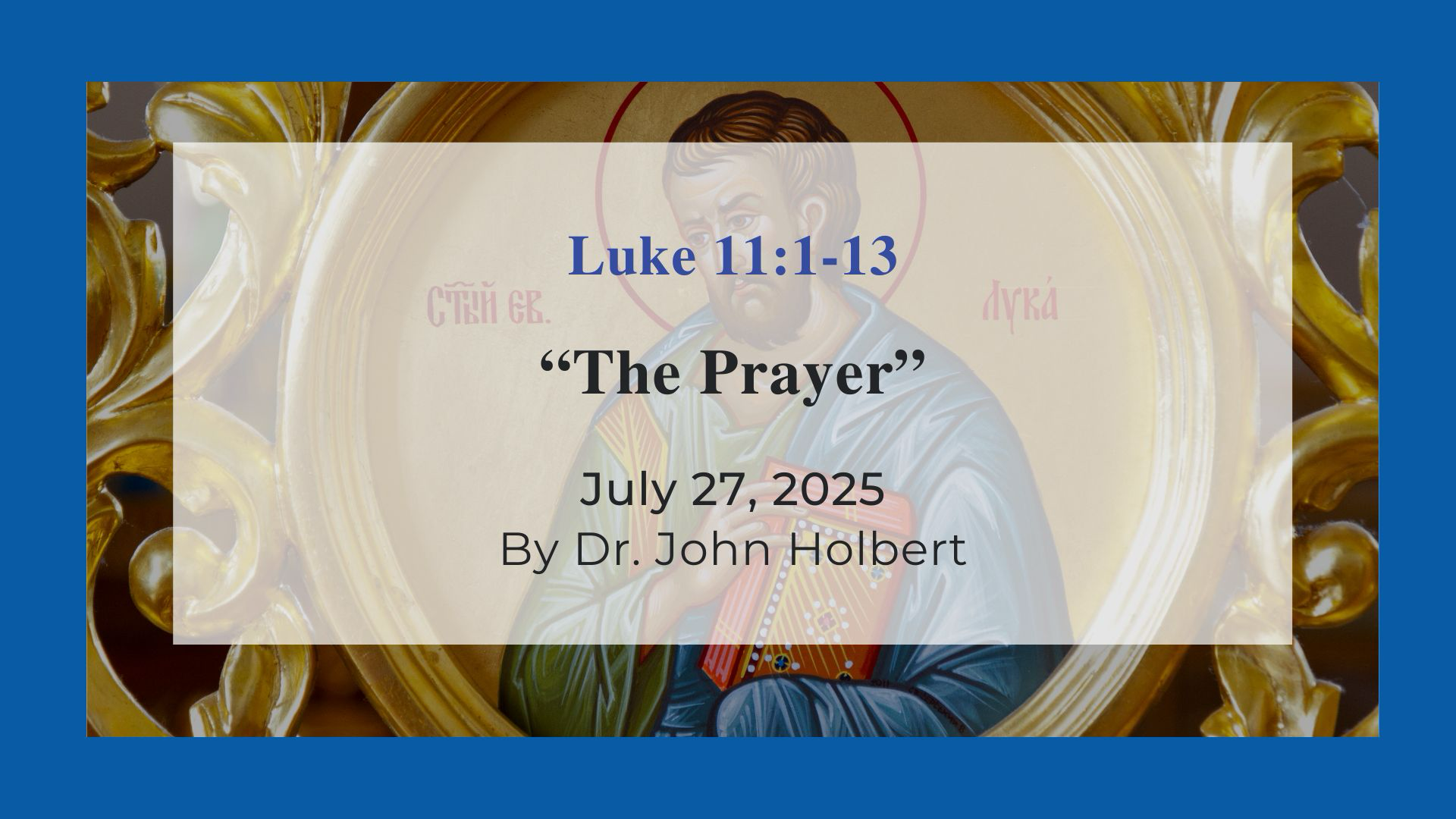The Prayer - Reflections on Luke 11:1-13, Pentecost 7, Year C
by John C. Holbert on Friday, May 16, 2025

Today we have a brief look at Luke’s version of the prayer that many of us say each week at least once in a service of worship. We know it as “the Lord’s Prayer,” and it is a response given by Jesus to his disciples when they ask, “Lord, teach us to pray,” to which Luke adds, “just as John taught his disciples” (Luke 11:1). Unlike Matthew’s version, Luke describes for us a generalized “certain spot” as the location of this interchange. In Matthew, Jesus uses the Sermon on the Mount as the locus of Jesus’s particular prayer (Mt.6:9-13). Luke appears especially concerned with the ministry of John, offering several details of that ministry: preaching (Luke 3:18); fasting (Luke 7:33); as well as noting that John’s disciples both fasted and prayed (Luke 5:33). Of course, for Luke John was shut up in prison by Herod Antipas, even before Jesus’s baptism, due to John’s rebuke of him over the business of Herod’s marriage to Herodias, Herod’s brother’s wife (Luke 3:19).
Luke’s version of the Lord’s prayer is particularly spare, including only five separate elements. First, it begins in an especially familiar Jewish way. “Father, may your name be holy” (Luke 11:2). The Jewish kaddish (Hebrew “holy”) prayer, a common prayer of Judaism, begins, “Magnified and sanctified be (his) great name, and one of the famous Eighteen Benedictions (shemonah esre) includes Sanctification of the Name (Kedushat ha Shem). The second element is “may your kingdom come” (Luke 11:2). The prayer now asks for the rule of God to be made manifest among humanity, and is once again paralleled in the kaddish. Luke does not add, as does Matthew, “your will be done,” an integral part of all modern versions of the prayer.
The third element is usually translated “Give to us today (every day?) the bread we need” (Luke 11:3). The problem is that the word rendered “today” is found nowhere else in any Greek literature. That word is epiousios, which, according to Luke Johnson in his 1991 commentary, has three “likely options” for translation: 1) “daily,” 2) “future,” and 3) “necessary” (Page 178). Because the content of the prayer in Luke is given in the context of the need for provision in hospitality, “bread we need” may be the best of the options for Luke. The fourth element is: “Forgive us our sins, for we ourselves also forgive everyone who owes us” (Johnson’s translation). The literal reading of the second clause is “debtors,” a word used in certain modern denominations during the recitation of the prayer. (I spent five years in a Presbyterian church, and regularly struggled to mouth “debts,” after my many Methodist recitations of “trespasses”.) Whichever of those words is used, the meaning appears the same. We may ask forgiveness of God for our “manifold sins and wickedness” only if we in turn forgive the debts, trespasses, and sins of those who have acted against us.
The final Lukan element of his version of the Lord’s prayer is “Do not lead us into testing.” Because God controls human activity (see 1 Cor.10:13), testing is a constant in human life. We should remember Jesus’s comment in the garden of Gethsemane, “pray that you not enter into testing” (Luke 22:40,46), yet that testing will all too soon come to these disciples in the face of Jesus’s denial, torture, and death. The five brief elements of Luke’s Lord’s Prayer contain major themes of his understanding of Jesus’ prophetic mission in the world: the breaking in of God’s rule, the gift from God of daily needs, the gift of God’s forgiveness to be matched by human forgiveness of others, and the inevitable testing of those who would follow the prophet.
Luke follows his enumeration of Jesus’s prayer with a small parable of the friend at midnight, teaching that even out of shame the lazy friend will finally give the bread needed to offer to a late-night visitor; how much more will God give to those who ask—just as the Lord’s prayer has urged us to ask. And Luke concludes his teaching with the short tales of the need to keep at the work of asking, for no father of any kind will give a son a snake when he asked for a fish, nor a scorpion when he asks for an egg. “Now if you, wicked as you are, know how to give good gifts to your children, how much more your father will give the Holy Spirit from heaven to those who ask” (Luke 11:13). Luke slips into his narrative his special concern for the Holy Spirit that drives so much of the movement of his Gospel. And, of course, in Acts 2 at Pentecost the Holy Spirit will fall upon the early believers as the instigator of the beloved community.
The prayer we pray today is much expanded from the one Luke says Jesus taught his disciples, yet the essence of that prayer remains intact, despite the various iterations of its use over the centuries and among the many denominations found today. We still, like those eager disciples two millennia ago, hunger for help as we seek the will and way of God for our own lives now. The Lord’s Prayer has offered such help for nearly 2000 years!
